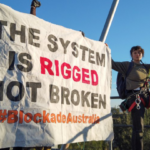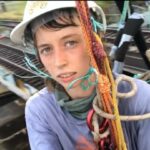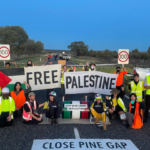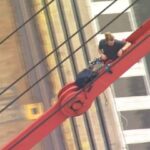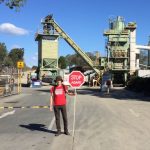Activists Vow to Proceed with Newcastle Coal Port Blockade, Despite Court Prohibition
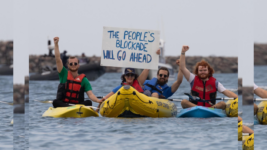
Despite the NSW Supreme Court having ruled on Thursday, 7 November 2024 that The People’s Blockade of the World’s Largest Coal Port set to take place over the weekend of the 22nd to 25th of November not being able to go ahead due to safety concerns, organisers of the event announced later that same day that regardless of the court outcome, climate defenders are defiantly asserting it will go ahead.
NSW police commissioner Karen Webb announced on 29 October that she was taking organisers to court to see the broader 10 day climate festival set to take place at Newcastle’s Horseshoe Beach and Camp Shortland, closed down. And NSW premier Chris Minns, who’s been a keen critic of protests of late, to the point of suggesting that police should refuse them on financial grounds, was backing her.
The 7th of November decision to prohibit the Rising Tide protest followed another unsuccessful attempt by commissioner Webb to cancel the 52nd consecutive Free Palestine protest last month, while her predecessor, Mick Fuller, attempted to shut down the massive Black Lives Matter protest of June 2020, as well as a follow up later that same year on Gadigal land at Djarrbarrgalli-the Domain.
In it’s first successful attempt to close down a public assembly over recent years, NSW police commissioner Webb was able to invoke the power she has under section 25 of the Summary Offences Act 1988 (NSW), which permits her to seek an order from the court to prohibit an event after a Form 1 that’s been lodged to notify law enforcement of a public assembly at least seven days prior to it.
“Whilst the judge ruled in favour of the police, rejecting our Form 1 application for The People’s Blockade, it is still lawful to assemble in the park and on the beach and to paddle on the harbour,” Rising Tide set out in an email to supporters on Thursday evening. “The People’s Blockade will go ahead.”
Form 1 impunity
In his 7 November final findings, Supreme Court Justice Desmond Fagan outlined that Rising Tide organisers had lodged a Form 1 with “haters gonna hate” Webb on 9 October, informing her of two public assemblies over specific dates that would involve 10,000-odd persons gathered on Horseshoe Beach and for a 30 hour kayaking assembly on Newcastle Harbour over that weekend.
In NSW, protest organisers are required to submit a Form 1, under the terms of section 23 of the Summary Offences Act, detailing the date, location and expected number of participants related to a planned event seven days prior to it taking place.
However, as Rising Tide spokesperson Zack Schofield told Sydney Criminal Lawyers last week, a Form 1, or Notice of Intention to Hold a Public Assembly, is not a request for approval, but rather, it’s more like “a courtesy call” to police notifying the agency of what’s taking place, and, as in the present case, if the commissioner takes issue with what is proposed, the office bearer can contest it to the court.
If the commissioner doesn’t attempt to shut down a public assembly after Form 1 notification, or the attempt to shut down an event fails, then section 24 of the Summary Offences Act maintains that a person participating in the approved public assembly cannot be arrested for partaking in the event or for the obstruction of any person, vehicle or vessel in the public place, as part of that participation.
Police powers in play
The recent proceedings took place over three days, as multiple issues had to be explored: the assemblies were considered “exceptional in their intended duration and disruptive effect”, protesting upon the shipping channel raised safety concerns, Webb sought to ensure police retain its ability to arrest, which Form 1 acceptance extinguishes, while the defence long questioned the safety premise.
Justice Fagan outlined that even if he did rule out the event, it would not make all associated behaviour unlawful. However, blocking the waterway would be in breach of the law, while the campsite festival might breach local council regulations.
The judge added that under such circumstances, NSW police officers would be able to move the people involved on using the powers under section 197 and 198A of the Law Enforcement (Powers and Responsibilities) Act 2002 (NSW), also known as the LEPRA. And from there, if a participant fails to obey such a direction, they can be arrested under section 200 and fined $220.
This month’s planned Rising Tide festival and kayak protest action on Newcastle Harbour also took place last year, with approval of the authorities. The authorised blockade of the waterway took place over 30 hours.
However, when the approved period on the water expired around 100 participants continued to block the waterway for a further 2 hours prior to the mass arrest of those remaining.
Those gathered on the waterway without approval on 26 November last year were subsequently charged with unreasonable interference of a waterway, via the use of a vessel, which then impinges upon the lawful use of it by others, contrary to section 14 of the Marine Safety Act 1998 (NSW) This carries a maximum penalty of a $5,500 fine.
The protest will continue
“Weighing up the competing considerations,” Justice Fagan said on 7 November, “I regard it as very clear that an order prohibiting the proposed blockade of the Port of Newcastle should be made, with the consequence that protesters who contravene the Marine Safety Act by obstructing the channel will be liable to prosecution and the police will have their usual powers.”
“A 30 hour interruption to the operations of a busy port is an imposition on the lawful activities of others that goes far beyond what the people affected should be expected to tolerate,” he added.
In terms of the four day protest assembly in the park, Fagan said it was “unheard of”. He added that the removal of police powers doesn’t allow for the chance of “unpredictability” at the event. And he further added that if at least some people do arrive on Horseshoe Beach with kayaks to continue to block the waterway, a land-based assembly will block officer passage to the water.
And in light of the concerns he identified, Justice Fagan prohibited both the land and water-based protests from going ahead.
Schofield told the ABC on Thursday, following the decision of the court, that The People’s Blockade has not actually been prohibited, as civilians “have a right to peaceful assembly on land and water in this state”.
“NSW police have chosen to contest our Form 1, which is a form which makes the event more predictable, safer for all participants, and we think it’s a real shame they’ve decided to use taxpayer resources to do so,” the climate defender concluded.


